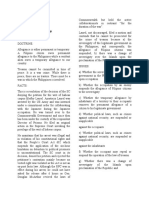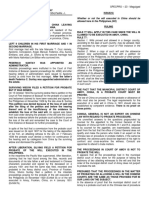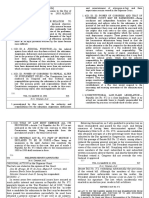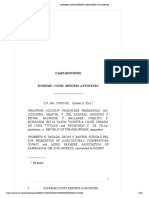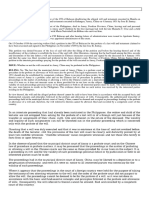Sto. Tomas V. Salac G.R. NO. 152642, NOVEMBER 13, 2012
Sto. Tomas V. Salac G.R. NO. 152642, NOVEMBER 13, 2012
Uploaded by
Catherine MonesCopyright:
Available Formats
Sto. Tomas V. Salac G.R. NO. 152642, NOVEMBER 13, 2012
Sto. Tomas V. Salac G.R. NO. 152642, NOVEMBER 13, 2012
Uploaded by
Catherine MonesOriginal Description:
Original Title
Copyright
Available Formats
Share this document
Did you find this document useful?
Is this content inappropriate?
Copyright:
Available Formats
Sto. Tomas V. Salac G.R. NO. 152642, NOVEMBER 13, 2012
Sto. Tomas V. Salac G.R. NO. 152642, NOVEMBER 13, 2012
Uploaded by
Catherine MonesCopyright:
Available Formats
STO. TOMAS V.
SALAC
G.R. NO. 152642, NOVEMBER 13, 2012
Facts:
On June 7, 1995 Congress enacted Republic Act (R.A.) 8042 or the Migrant Workers and Overseas
Filipinos Act of 1995 that, for among other purposes, sets the Government’s policies on overseas
employment and establishes a higher standard of protection and promotion of the welfare of migrant
workers, their families, and overseas Filipinos in distress. On January 8, 2002 respondents filed a
petition for certiorari, prohibition and mandamus with application for temporary restraining order
(TRO) and preliminary injunction against petitioners, the DOLE Secretary, the POEA Administrator, and
the Technical Education and Skills Development Authority (TESDA) Secretary-General before the
Regional Trial Court (RTC) of Quezon City. These consolidated cases pertain to the constitutionality
of certain provisions of the aforementioned law.
Issues:
Whether or not Sections 6, 7, and 9 of R.A. 8042 are constitutional
Ruling:
Section 6 is valid and constitutional. “illegal recruitment” as defined in Section 6 is clear and
unambiguous and, contrary to the RTC’s finding, actually makes a distinction between licensed and non-
licensed recruiters. By its terms, persons who engage in “canvassing, enlisting, contracting, transporting,
utilizing, hiring, or procuring workers” without the appropriate government license or authority are
guilty of illegal recruitment whether or not they commit the wrongful acts enumerated in that section.
On the other hand, recruiters who engage in the canvassing, enlisting, etc. of OFWs, although with the
appropriate government license or authority, are guilty of illegal recruitment only if they commit any of
the wrongful acts enumerated in Section 6.
Section 9 is valid and constitutional. SEC. 9. states that Venue. – A criminal action arising from illegal
recruitment as defined herein shall be filed with the Regional Trial Court of the province or city where
the offense was committed or where the offended party actually resides at the time of the commission
of the offense: Provided, That the court where the criminal action is first filed shall acquire jurisdiction to
the exclusion of other courts: Provided, however, That the aforestated provisions shall also apply to
those criminal actions that have already been filed in court at the time of the effectivity of this Act.
There is nothing arbitrary or unconstitutional in Congress fixing an alternative venue for violations of
Section 6 of R.A. 8042 that differs from the venue established by the Rules on Criminal Procedure.
Indeed, Section 15(a), Rule 110 of the latter Rules allows exceptions provided by laws. Thus: SEC. 15.
Place where action is to be instituted.— (a) Subject to existing laws, the criminal action shall be
instituted and tried in the court of the municipality or territory where the offense was committed or
where any of its essential ingredients occurred. (Emphasis supplied). Section 9 of R.A. 8042, as an
exception to the rule on venue of criminal actions is, consistent with that law’s declared policy15 of
providing a criminal justice system that protects and serves the best interests of the victims of illegal
recruitment.
You might also like
- Philip Morris, Inc. vs. CA (G.R. No. 91332 July 16, 1993)Document5 pagesPhilip Morris, Inc. vs. CA (G.R. No. 91332 July 16, 1993)ellavisdaNo ratings yet
- Civil Law Review I Preliminary Examination October 18, 2021Document3 pagesCivil Law Review I Preliminary Examination October 18, 2021Mikes FloresNo ratings yet
- Legal Memorandum For ProsecutionDocument5 pagesLegal Memorandum For ProsecutionAnge Buenaventura Salazar88% (8)
- Roque V People DigestDocument2 pagesRoque V People DigestBenilde DungoNo ratings yet
- Philex Mining Corp. Vs CIRDocument20 pagesPhilex Mining Corp. Vs CIRJerome ArañezNo ratings yet
- Fineness of Hydraulic Cement and Raw Materials by The 300 - M (No. 50), 150 - M (No. 100), and 75 - M (No. 200) Sieves by Wet MethodsDocument4 pagesFineness of Hydraulic Cement and Raw Materials by The 300 - M (No. 50), 150 - M (No. 100), and 75 - M (No. 200) Sieves by Wet MethodsJohnCarlosGilNo ratings yet
- GR 202897 2019 PDFDocument49 pagesGR 202897 2019 PDFCharisse ToledoNo ratings yet
- Lee Pue Liong A.K.A. Paul Lee vs. Chua Pue Chin LeeDocument6 pagesLee Pue Liong A.K.A. Paul Lee vs. Chua Pue Chin LeeAkoo Si EarlNo ratings yet
- Classification of ThingsDocument3 pagesClassification of ThingsKaulayaw PormentoNo ratings yet
- Title 1 Crimes Against National Security and The Law of NationsDocument14 pagesTitle 1 Crimes Against National Security and The Law of NationssunNo ratings yet
- Criminal Law II CasesDocument94 pagesCriminal Law II CasesNikkiContadoNo ratings yet
- Mendez vs. People 2014Document10 pagesMendez vs. People 2014Elreen Pearl AgustinNo ratings yet
- Agency Case DigestDocument8 pagesAgency Case DigestGrace FrianezaNo ratings yet
- Republic v. Liyao, GR No. L-35947, 214 SCRA 292, Oct. 20, 1992Document3 pagesRepublic v. Liyao, GR No. L-35947, 214 SCRA 292, Oct. 20, 1992Ciara NavarroNo ratings yet
- Evidence Part 1 PDFDocument7 pagesEvidence Part 1 PDFattytheaNo ratings yet
- Orient Air V CADocument14 pagesOrient Air V CANeil BorjaNo ratings yet
- Federation of Coron, Busuanga, Palawan Farmer's Assoc., Inc. Et. Al. vs. Secretary of The DENR and DARDocument50 pagesFederation of Coron, Busuanga, Palawan Farmer's Assoc., Inc. Et. Al. vs. Secretary of The DENR and DARsamantha.makayan.abNo ratings yet
- Bayan Muna VS RomuloDocument2 pagesBayan Muna VS RomuloPawix 55No ratings yet
- Judicial Affidavit Of: Republic of The Philippines Regional Trial Court Branch 46Document5 pagesJudicial Affidavit Of: Republic of The Philippines Regional Trial Court Branch 46Rollyn Dee De Marco PiocosNo ratings yet
- Laguna Lake Development Authority VS Court of AppealsDocument7 pagesLaguna Lake Development Authority VS Court of AppealsNoo NooooNo ratings yet
- Whether or Not The Will Executed in China Should Be Allowed Here in The Philippines (NO)Document2 pagesWhether or Not The Will Executed in China Should Be Allowed Here in The Philippines (NO)Basil MaguigadNo ratings yet
- Statcon Reviewer Quiz 2Document9 pagesStatcon Reviewer Quiz 2Julius Manalo100% (1)
- Stat Con LectureDocument3 pagesStat Con LectureRamil F. De JesusNo ratings yet
- Magallona vs. ErmitaDocument33 pagesMagallona vs. ErmitaFrance De LunaNo ratings yet
- AGENCY 1st Digest 8-24-16Document23 pagesAGENCY 1st Digest 8-24-16Janette TitoNo ratings yet
- SYLLABUSDocument16 pagesSYLLABUSRain DCNo ratings yet
- Recentjuris Civil Law FinalDocument86 pagesRecentjuris Civil Law Finaljade123_129No ratings yet
- In Re - CunananDocument52 pagesIn Re - CunananJasmin ApostolesNo ratings yet
- Property Case Digest 19-23Document12 pagesProperty Case Digest 19-23ZethMoranaNo ratings yet
- Soriano vs. Marcelo, GR No. 163178, January 7, 1936Document7 pagesSoriano vs. Marcelo, GR No. 163178, January 7, 1936James OcampoNo ratings yet
- Bill of RightseDocument57 pagesBill of RightseRyan BarnettNo ratings yet
- James Decolongon (List of Objections) TrialTechdocxDocument1 pageJames Decolongon (List of Objections) TrialTechdocxJames DecolongonNo ratings yet
- Case Digest - Cabatingan Vs ArcuenoDocument1 pageCase Digest - Cabatingan Vs ArcuenoValencia and Valencia OfficeNo ratings yet
- Philippine Coconut Producers Federation, Inc. (COCOFED) vs. Republic, 805 SCRA 1, G.R. Nos. 177857-58, G.R. No. 178193 October 5, 2016Document104 pagesPhilippine Coconut Producers Federation, Inc. (COCOFED) vs. Republic, 805 SCRA 1, G.R. Nos. 177857-58, G.R. No. 178193 October 5, 2016Trea CheryNo ratings yet
- Bustos Vs Lucero PDFDocument1 pageBustos Vs Lucero PDFVirnadette LopezNo ratings yet
- Revaldo v. People Olympio Revaldo V. People of The Philippines, (A W/ Mod)Document26 pagesRevaldo v. People Olympio Revaldo V. People of The Philippines, (A W/ Mod)Jann Bryle UnajanNo ratings yet
- A.C. No - .10138Document8 pagesA.C. No - .10138Anonymous KgPX1oCfrNo ratings yet
- Evidence Compiled CasesDocument12 pagesEvidence Compiled CasesJoVic2020No ratings yet
- Yu Hwa Ping V Ayala LandDocument40 pagesYu Hwa Ping V Ayala LandKenneth Taguiba100% (1)
- PIL DigestDocument15 pagesPIL DigestrheyneNo ratings yet
- Lagon vs. VelascoDocument14 pagesLagon vs. VelascoKen ChaseMasterNo ratings yet
- in Re Del Castillo DigestsDocument14 pagesin Re Del Castillo DigestsAlcazar Renz JustineNo ratings yet
- Cobalt Resources Inc. v. AguadoDocument9 pagesCobalt Resources Inc. v. AguadoTris LeeNo ratings yet
- First Division: PhilippinesDocument15 pagesFirst Division: PhilippinesIan San AndresNo ratings yet
- Cases in Nat ResDocument98 pagesCases in Nat ResJoyceNo ratings yet
- 6725 - Halagueña v. Philippine Airlines, Inc.Document15 pages6725 - Halagueña v. Philippine Airlines, Inc.JaciNo ratings yet
- LBP Vs BarridoDocument4 pagesLBP Vs BarridoRotsen Kho YuteNo ratings yet
- Criminal Procedure SyllabusDocument5 pagesCriminal Procedure SyllabusFernand CJ CastroNo ratings yet
- Agency Compiled CasesDocument60 pagesAgency Compiled Casessetsu hizuriNo ratings yet
- JMM Promotions Vs NLRCDocument8 pagesJMM Promotions Vs NLRCBam BathanNo ratings yet
- Case Digest in Property - OwnershipDocument10 pagesCase Digest in Property - OwnershipyourjurisdoctorNo ratings yet
- Lim Vs Spouses LazaroDocument8 pagesLim Vs Spouses Lazarocharmagne cuevasNo ratings yet
- Heirs of Protacio Go Vs BarolaDocument2 pagesHeirs of Protacio Go Vs BarolaAnsaiMendozaNo ratings yet
- G.R. No. 172716Document10 pagesG.R. No. 172716Andrina Binogwal TocgongnaNo ratings yet
- Chapter IDocument20 pagesChapter ICHARLOTNo ratings yet
- RP Vs BanezzzzzDocument4 pagesRP Vs BanezzzzzEKANGNo ratings yet
- LabrevDocument48 pagesLabrevybunNo ratings yet
- Maza Vs Sec GonzalesDocument4 pagesMaza Vs Sec GonzalesJames LanzarNo ratings yet
- CONSTI 2 DigestsDocument20 pagesCONSTI 2 DigestsAlvin VarsoviaNo ratings yet
- Cases 1 To 4Document9 pagesCases 1 To 4kaitoryugaNo ratings yet
- Lagon Vs Hoover Camalco IndustriesDocument17 pagesLagon Vs Hoover Camalco IndustriesLourdes LescanoNo ratings yet
- 8 - Sto. Tomas v. Salac, G.R. No. 152642, November 13, 2012 (En Banc)Document3 pages8 - Sto. Tomas v. Salac, G.R. No. 152642, November 13, 2012 (En Banc)rommel alimagnoNo ratings yet
- People Vs Napat-ADocument4 pagesPeople Vs Napat-AHiroshi CarlosNo ratings yet
- LTB v. TiongsonDocument2 pagesLTB v. TiongsonJacky Royce100% (1)
- Echavez vs. Dozen ConstructionDocument1 pageEchavez vs. Dozen ConstructionEm Asiddao-DeonaNo ratings yet
- Eugene T. Rossides (1927-2020)Document12 pagesEugene T. Rossides (1927-2020)ARISTEIDIS VIKETOSNo ratings yet
- Free Job Application Form - Standard TemplateDocument3 pagesFree Job Application Form - Standard TemplateMark MartinezNo ratings yet
- Government Expenditure and TaxationDocument21 pagesGovernment Expenditure and TaxationJutt TheMagicianNo ratings yet
- Solving Word Problems Involving Sales Tax: Kristoffer A. RañolaDocument34 pagesSolving Word Problems Involving Sales Tax: Kristoffer A. RañolaKristoffer A. RañolaNo ratings yet
- Mahesh V AnilkantDocument4 pagesMahesh V Anilkantarunarprasad2000No ratings yet
- Edward Vieth Sittler v. United States, 316 F.2d 312, 2d Cir. (1963)Document28 pagesEdward Vieth Sittler v. United States, 316 F.2d 312, 2d Cir. (1963)Scribd Government DocsNo ratings yet
- 2023-01-10 - Letter - WHCO - Biden Confidential DocsDocument2 pages2023-01-10 - Letter - WHCO - Biden Confidential DocsCBS News PoliticsNo ratings yet
- Rmo 08-2017 PDFDocument34 pagesRmo 08-2017 PDFJill b.No ratings yet
- EC 22,57,503 Upgradation of Office of The Personal Branch For E-office-DDADocument2 pagesEC 22,57,503 Upgradation of Office of The Personal Branch For E-office-DDASachin MoryaNo ratings yet
- Macarrubo - v. - MacarruboDocument10 pagesMacarrubo - v. - MacarruboVSBNo ratings yet
- EEO Complaint Process BrochureDocument2 pagesEEO Complaint Process BrochureKyle Fernando Foster-ElNo ratings yet
- Office of The Chaklala Cantonment Board: For PID OnlyDocument3 pagesOffice of The Chaklala Cantonment Board: For PID OnlyNazir Ahmed MaharNo ratings yet
- 7 Crim1 - People Vs Adlawan - Passion or ObfuscationDocument2 pages7 Crim1 - People Vs Adlawan - Passion or ObfuscationJustin Reden BautistaNo ratings yet
- Forms of Jurisdiction:: 2) Subjective Territoriality-Where CommencedDocument5 pagesForms of Jurisdiction:: 2) Subjective Territoriality-Where CommencedRalph TiempoNo ratings yet
- Chapter Two-1Document9 pagesChapter Two-1keisha babyNo ratings yet
- Hilary Clinton Email ControversyDocument3 pagesHilary Clinton Email ControversyZhiyi FooNo ratings yet
- Judicial Pronouncement On Contempt of Court: Supra NoteDocument12 pagesJudicial Pronouncement On Contempt of Court: Supra NoteDeepanshu ShakargayeNo ratings yet
- Crew AgreementDocument6 pagesCrew Agreementapi-237308307100% (2)
- Leg 2601Document4 pagesLeg 2601Unathi LionNo ratings yet
- Y.Akshay PRN: 16010323006 Batch: 2016-2021Document6 pagesY.Akshay PRN: 16010323006 Batch: 2016-2021Sathvik ReddyNo ratings yet
- Lease of Immovable Property Under Transfer of Property Ac1Document16 pagesLease of Immovable Property Under Transfer of Property Ac1Lavkesh BhambhaniNo ratings yet
- AssignmentDocument9 pagesAssignmentSarkar BasitNo ratings yet
- Welcoming Remarks by HDocument4 pagesWelcoming Remarks by HHaki NgowiNo ratings yet
- Movement For Democracy in NepalDocument10 pagesMovement For Democracy in NepalAbhinav PathakNo ratings yet
- Kes GDPD Factory SDN BHDDocument17 pagesKes GDPD Factory SDN BHDMohamad Izwan Mohamad RawanNo ratings yet









